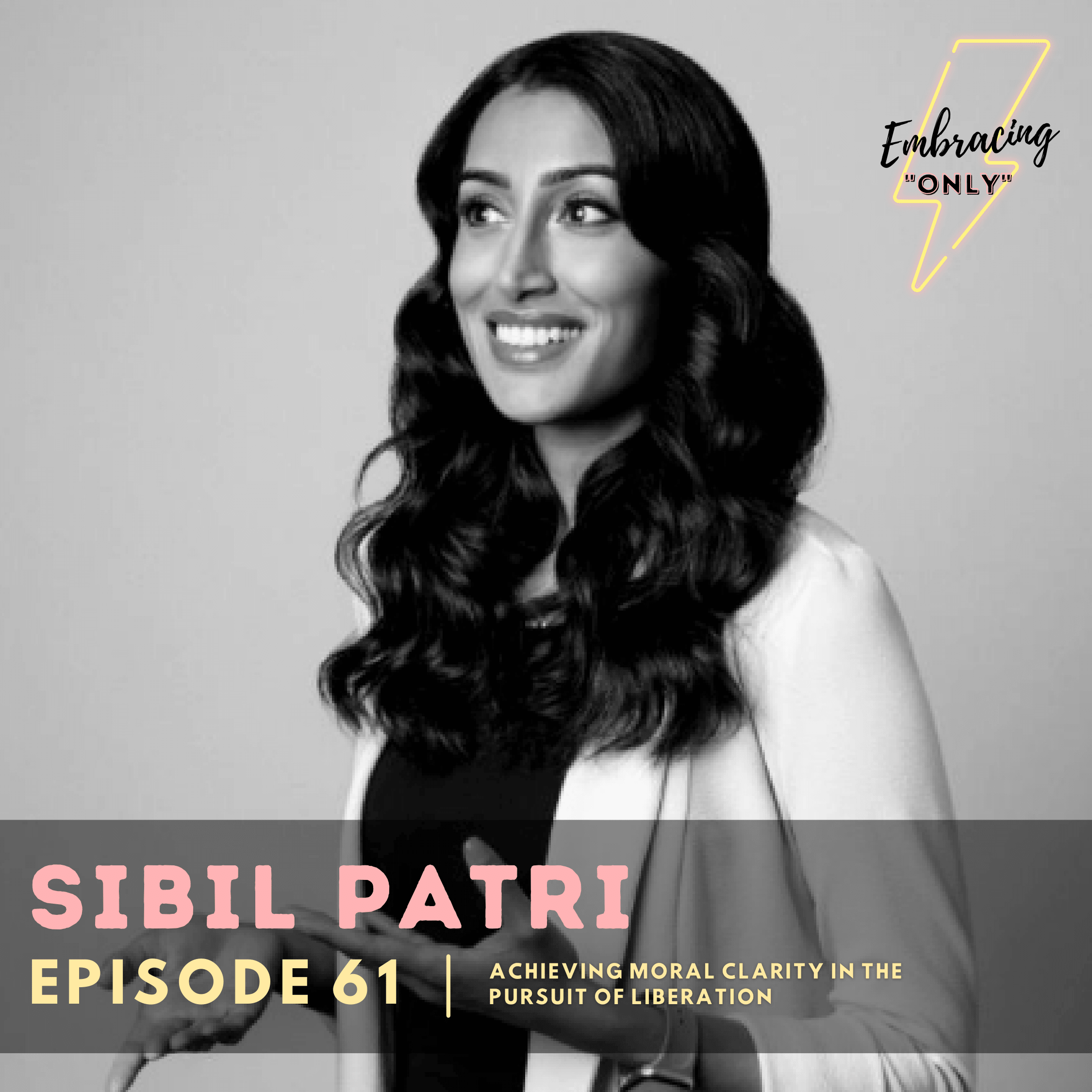Achieving Moral Clarity in the Pursuit of Liberation
Sibil Patri, a dynamic and visionary leader whose career spans over two decades across finance and strategy, is a sought-after voice in discussions around diversity, inclusion, and systemic change thanks to her extensive corporate experience with a deep understanding of social dynamics.
Listen to the episode or scroll down to read the blog post ↓
As a first-generation US citizen with roots in Kerala, India, she brings a unique and diverse perspective to her work.
Sibil’s journey began in the high-stakes world of corporate America, where she made a significant mark as an award-winning financial strategy executive for success in this arena.
However, this was just a prelude to a more profound calling. Realizing that her true passion lies in creating systemic change and fostering inclusive environments, Sibil founded In Pursuit Collective.
This initiative reflects her commitment to advocacy and empowerment, focusing on coaching, collaborating, and storytelling to uplift marginalized and racialized communities.
In this blog post, we’re covering the following:
Click here to listen on Apple Podcasts. While you're there, subscribe and leave us a rating and review if you enjoy the episodes.
1) Liberating the Mind
We work with a lot of women who find themselves in high-level executive roles feeling completely unfulfilled, but scared to take a leap to align with their passions. Sibil did take that leap but her story is a little bit different than usual.
Sibil enjoyed the corporate world and didn’t realize all the harm it was doing to her.
“For me, it helped me cope with trauma that I had in the past. So I really liked the structure and the validation and climbing up something, reaching a goal. Those things made me feel like normal.” - Sibil Patri
It was only when she was met with resistance to her success that she started questioning everything.
“For a couple of years, I let the fear stop me and said, maybe I don't need to go up that high, I'll stay where I am. I'm still getting paid. I'm still providing for my family. The financial security was so important to me.” - Sibil Patri
Sibil explains that this came from having an entrepreneur dad who had a convenience store and no health care or benefits.
“For the first 21 years of my life, I didn't have a doctor. We would just sit home and pray when I got sick. And so I enjoyed the safety net of corporate. But I realized that corporate was killing me too.” - Sibil Patri
There are always core beliefs that we hold deep within ourselves that drive our behaviors. Sibil explains that she had to reprioritize. As a child of immigrants, her parents came to America in survival mode.
“For them, liberation meant financial freedom. And as we continue along with that legacy, for me, liberation means something a little bit different than that.” - Sibil Patri
Sibil explains that while she still cares about financial freedom, she has moved past poverty.
“Now it's more about liberating the mind.” - Sibil Patri
2) Rest and Alignment to Unlock Productivity
By leaving corporate America, Sibil has been able to take control of her mental health. One significant component of this is rest.
The world is on fire as we speak. There are people out there, that can’t even talk about rest. Rest is a luxury.
There is a dichotomy between rest and moving, speaking out, activating, and empowering those who don’t have a choice to rest.
It’s a hard choice to make.
However, to keep going in pursuit of liberation, you need to do it SUSTAINABLY. You have to recharge your energy so that you can continue to work. It's not about productivity, it's about alignment.
You can be productive in anything that you do, but once you get into alignment, productivity starts to mean a lot more.
“The system that we live in does not necessarily allow people to be aligned with liberation.” - Sibil Patri
The systems that we live in weren’t built for true alignment with a liberation movement which complicates matters.
3) Personal Sacrifices of Liberation Work
Sibil shares that for the 20 years she was in financial services and corporate spaces she presented a corporate persona. Topics of liberation are taboo in those spaces. Everything Sibil felt about humanity, she kept bottled up.
“I needed to release that. And I did have a choice. You're right. But it was a calling.” - Sibil Patri
For Sibil, there was no other way to pursue liberation other than completely and freely because she knows what it feels like to have her fundamental human rights and dignity taken away from her.
Because of her experiences, she is able to look at everything around her with moral clarity and discernment.
“That is what I'm fighting for. I'm not passionate about anything other than every human being, should live with dignity, and they should live with respect.” - Sibil Patri
Sibil explains that this is foundational.
4) Speaking Your Truth
Speaking your truth is scary, but every time you do it, it gets easier.
“What you gain is this fearlessness of being unbought. Being able to stand in your truth and discern what you're doing and why you're doing it with clarity.” - Sibil Patri
There are always going to be people against you when you speak out.
“It gives you that resilience that you always wish you didn't need. And it also gives you this discernment and clarity.” - Sibil Patri
It's not the absence of fear. It's feeling the fear and doing it anyway.
“I am still scared when I talk in spaces and I speak truth to power. My voice still shakes. But I do it with so much conviction. I just know that it needs to be done. And I know that I'm the vessel that needs to carry the message.” - Sibil Patri
Sibil explains that it may come with awkwardness.
“There are people that don't talk to me anymore. I've lost friends. But none of it actually matters when you have moral clarity. [...] It just shifts you to a different space of being who you are unapologetically.” - Sibil Patri
5) Unlearning People-Pleasing
In many ways, an immigrant upbringing can cause us to be people-pleasers.
“One of the things that I learned earlier on and this helped me, but it's not a happy story, I will never make my mom happy. Never. We are just two completely different people.” - Sibil Patri
At the core, parental validation is something most people need. Because of this, Sibil started trying to get validation from other sources like her work.
“At this point, I just want to be enough for myself. And I want to show up for my children and my husband, who embrace me for who I am.” - Sibil Patri
This doesn’t make it easy. There are always repercussions to what you do.
“It's not about being a good Indian girl. It's about breaking generational and systemic traumas and making it better for my descendants, not for those who came before me. I can be grateful for what they've done for me, but I need to make it better for the future. And that means being rock solid in the clarity of who you are. And it comes with a lot of pain. And it comes with a lot of loss.” - Sibil Patri
Mita has even heard people say they don’t know if they would trust her to watch their kids.
But what does that have to do with the workplace?
This means people in leadership positions are basing decisions on feelings.
Mita proposes we focus on the facts.
“Facts, not feelings. We all have a lot of feelings. Let's go back to the facts. So here we are talking about performance review. You mentioned being a cultural fit. Can we go back to what were her objectives? What were the results this year versus what we asked her to do? And has she exceeded them or has she not? Let's go back to the facts.” - Mita Mallick
Mita explains that through self-reflection, people may begin to realize that they’re talking about their feelings rather than the facts.
“If you get people to self-reflect with open-ended questions, they sometimes get there on their own. It doesn't always happen in the first conversation, but the more you do it and the more you practice as a team, you'll start to see people might pause because they realize that they're actually talking about their own personal feelings versus the facts of the situation. .” - Mita Mallick
6) Prioritizing Marginalized Groups in Leadership Development
Liberation work should center the most underrepresented. There’s a degree to which you can do this in corporate settings as well.
“When you center the most marginalized, the most underrepresented groups, that is when you actually see the most benefit.” - Sibil Patri
Sibil explains that as a leader, you should ask yourself if every single individual on your team has what they need to be successful to achieve their potential.
“If you're a leader, and you're not thinking about your team that way, and you're only thinking about what you can extract from them, then this isn't going to work.” - Sibil Patri
If you ask the most marginalized person on your team what they need, there are other people on the team who are going to benefit from that as well. An example of this is that men benefit from parental leave or people who don’t have a wheelchair like people with strollers or bicycle riders benefit from curbless access to sidewalks.
“So when you think you're doing something for just one person, you're not. You're actually helping the collective and that is what is missing.” - Sibil Patri
So many organizations center around the comfort of the majority and not the people who need it the most, and that is why they are failing.
To hear the full conversation, scroll all the way up and tune into episode 61.
About The Hosts: Olivia And Archita
OLIVIA
Olivia Grant Cream is the host and producer of the Embracing Only podcast. Nothing makes her happier than providing a platform to women who are changing the world.
Olivia is a proud US Veteran and HR Leader who is passionate about changing the face of corporate America by helping underrepresented people reclaim their power and live the life of their dreams.
She is an advocate for transitioning military members seeking second careers in the corporate landscape.
Olivia is a proud Jamaican and enjoys mentoring, coaching, classic cars, and nature. way you tell your story online can make all the difference.
→ You can work with Olivia here: www.oliviacream.com
→ Book her as a keynote speaker or moderator for your next ERG or company event.
ARCHITA
Archita Sivakumar Fritz is the Host and Producer of the Embracing Only podcast. Archita is an international executive, who has lived and worked in India, the U.S., Canada, and Germany.
She is the founder, principal of Ready Set Bold a workplace transformation firm that supports F500 to startups on their product, people and process transformation journey.
She is a fierce advocate for canceling the culture around the silence of bullying and harassment in the workplace through her work with Speak Out Revolution. She lives in Dusseldorf, Germany with her husband where they are raising their three third-culture kids.
→ If you want to work with Archita you can reach out to her here: www.readysetbold.com.
→ Book her as a speaker, moderator, or coach for your next company event or workshop.




